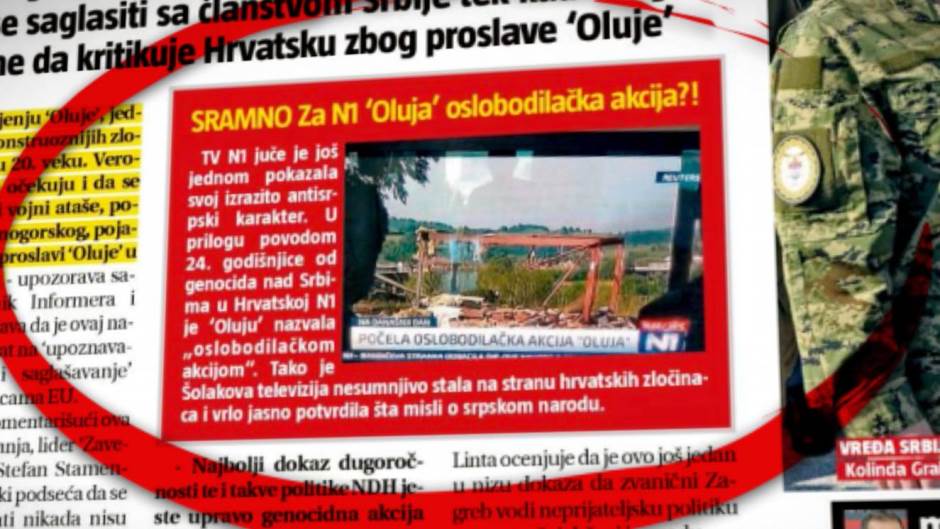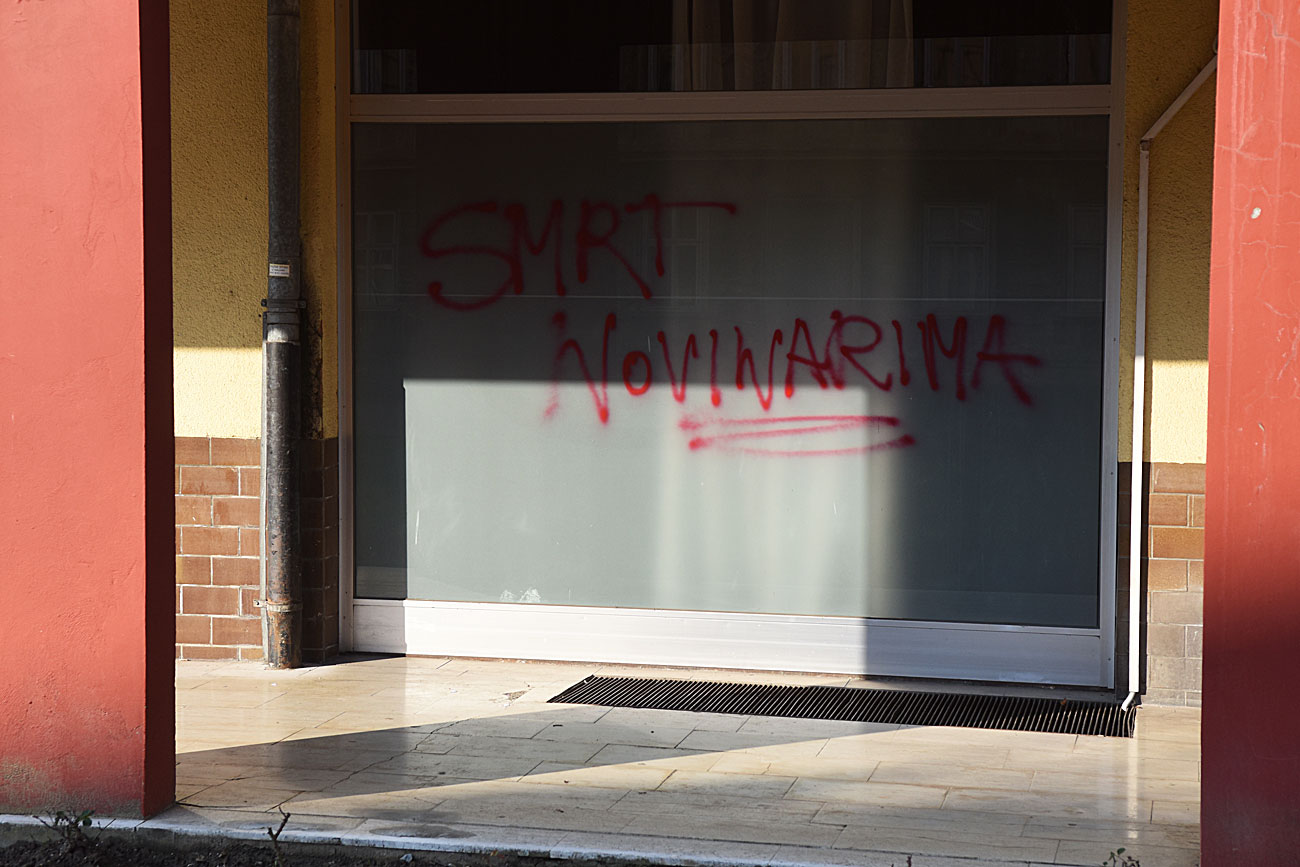BELGRADE, 07.08.2019. – Frequent attacks against journalists, lack of mechanisms for prosecuting those responsible, as well as political and economic pressures, present joint problems shared by countries in the region in the sphere of media freedoms and safety of journalists, an analysis of the European Commission’s country reports in the Western Balkan countries concluded.
On a late August evening last year BNTV journalist Vladimir Kovacevic was beaten up while returning home from his newsroom in Banja Luka. The beating happened after he had reported for weeks on protests against Republika Srpska authorities following the murder of a young man in Banja Luka.
After the attack against Kovacevic one person was arrested, while the second perpetrator is yet to be arrested.
“The key precondition for safety of journalists in a society lies in existence of rule of law and democratic state, which Bosnia and Herzegovina is not,” Kovacevic told safejournalists.net
The District Court in Banja Luka made a decision which is not final and sentenced Marko Colic to four years in prison for attempted murder of Kovacevic. The motives for the attack on Kovacevic have not yet been discovered, and neither the names of the persons who ordered attack are known.
The attack against Kovacevic is only one in a series of incidents that were registered in Bosnia and Herzegovina during 2018. Similar incidents were noted in nearly all countries in the region and, besides Bosnia and Herzegovina, the situation is particularly worrisome in Serbia, Kosovo* and Montenegro, the analysis of the individual 2018 European Commission country reports for the Western Balkan states.
Along with attacks against media workers, the EU Country Reports indicate that political and economic pressures are a fact of life in all countries in the region.
The Bosnian Country Report indicates that “physical and verbal attacks take place without systematic institutional response and effective protective measures”. The same sentence is repeated in documents describing progress made by Serbia, Kosovo and Montenegro. The situation in North Macedonia and Albania, according to the Reports, is somewhat better. No cases of attacks against journalists are mentioned.
Lawsuits as instruments for intimidation in Bosnia and Herzegovina
In Bosnia and Herzegovina political and financial pressure on the media continued, authorities often downplay the intimidation of journalists, and their reaction, including public condemnation, is weak, while the BH Novinari association’s free media help line recorded 58 cases of violation of journalists’ rights in 2018, including 6 cases of physical assault, 17 threats, and 9 cases of political pressure – the Report noted.
Elvira Jukic-Mujkic, editor with the Media Center in Sarajevo, considers that journalists do not feel sufficiently protected, because research conducted by the Bosnian Journalists Association BH Novinari in 2017 indicates that a considerable number of citizens in Bosnia and Herzegovina think that journalists should be beaten. She said that politicians attack and criticize media workers, while protection mechanisms are inadequate. Attacks are rarely prosecuted and when they are, perpetrators are sanctioned with inadequate penalties.
“Defamation suits in Bosnia and Herzegovina are used as an instrument of intimidation and pressure against journalists,” Jukic-Mujkic explains.
“We have an example of a politician filing a defamation suit against a journalist and then conditioning its withdrawal if the journalist agrees to stop writing about him. Once the journalist said no, the lawsuit was still withdrawn since it was unfounded”, she added.
Speaking about the financial and political pressure against the media, Jukic-Mujkic said that most politicians do not have to bother with censoring the media, because, unfortunately, the atmosphere created in the newsrooms is such that it is already known which topics are desirable and which are not. She claims that non-transparent media ownership presents an additional problem, because there is no insight into who is behind the media stations and how decisions are sometimes made.
Borka Rudic of the Association of BH Journalists considers it important that the European Commission Report demands more efficient work of judiciary and protection of journalists.
“Non-transparent ownership, political pressures, influences and attacks, as well as bad economic situation of the media and journalists, have resulted in lack of quality investigative professional journalism to the extent that would be needed in a post-war country that seeks to become an EU member and respect all the European standards for protection of freedom of expression and freedom of the media,” Rudic said.
Jukic-Mujkic says that the Press Freedom Index of the Reporters without Borders indicates that the situation in Bosnia is the best when compared to other countries in the region. But, as she said, this certainly does not mean that the situation in Bosnia is good, but only that the situation is, unfortunately, worse in other countries of the region. She adds that political and economic pressures are joint problems in all countries in the region.
Speaking about the problems facing countries in this region, Rudic said that they share joint problems – attacks against journalists not being solved adequately and the implementation of defamation laws.
Until September 2018, according to the report Indicators on the level of media freedom and journalists’ safety in Bosnia and Herzegovina, 21 cases of verbal and physical attacks on journalists were registered. There is a large number of serious criminal offenses against journalists, and the problem of impunity of perpetrators of these acts is still a concern and it is not addressed in a satisfactory manner.
“Journalists are unsatisfied with the reactions of relevant institutions and political actors, and they demonstrated this in protests organized in five towns across Bosnia and Herzegovina after the brutal attack on a journalist from Banja Luka, which was characterized as attempted murder”, stated the National report on Indicators on the level of media freedom and journalists’ safety in Bosnia and Herzegovina.
No safety for journalists in Serbia
The EU Country Report on Serbia noted that cases of threats, intimidation and violence against journalists remain a concern, while investigations and final verdicts are still rare. There are numerous credible reports on verbal and physical attacks, as well as attacks on property owned by journalists, while media associations reported that political, economic, and other pressures on journalists increased.
 While several cases were solved and criminal complaints filed, verdicts were still rare, the Report indicates. It further states that hate speech and discriminatory vocabulary are tolerated in the media and rarely solved by the regulatory authorities or prosecutors.
While several cases were solved and criminal complaints filed, verdicts were still rare, the Report indicates. It further states that hate speech and discriminatory vocabulary are tolerated in the media and rarely solved by the regulatory authorities or prosecutors.
Professor Dubravka Valic Nedeljkovic of the Faculty of Philosophy in Novi Sad said that, in the past few years, Serbia had continuously been dropping down towards the bottom of the list of 180 countries with regards to the Press Freedom Index of the Reporters without Borders. As she said, this year Serbia was in the 90th place, which means it had dropped down by 14 places in comparison to last year. She said this indicated that the media non-freedom in Serbia is getting bigger and more noticeable.
“The EC Report for Serbia clearly states that attacks by politicians against the media are rising, including physical threats. All those who even remotely criticize the authorities are openly condemned. The last open attack targeted N1 TV and came from the very top ranks of the government, which, by all laws, should not interfere with the media editorial policies,” Valic Nedeljkovic said.
Seven physical attacks and attacks against the property of journalists were recorded by the Serbian authorities during the reporting period. Some media associations reported that political, economic, and other pressures on journalists increased, it is stated in the EU Report for 2018.
“In this respect, Serbia needs to categorise these crimes as criminal or as other types of offences and ensure appropriate investigation and adjudication”, states in EU Report for 2018.
Professor Valic Nedeljkovic says that the simplest way of “disciplining” media is by subduing them financially.
“All in all the economic instability of the media market and chronic lack of money in the media essentially serves the authorities in a more subtle way, if not by providing them with open support, then at least by the lack of serious criticism,” Valic Nedeljkovic concluded.
According to Indicators on the level of media freedom and journalists’ safety in Serbia, during the period from September 2017 to the end of August 2018, recorded 28 attacks: 21 verbal threats, six physical attacks, and one attack against property. In comparison to the same period in 2017, approximately the same number of attacks was recorded. During 2018, among the recorded incidents, verbal threats prevail; half of these threats were addressed through the internet and social networks.
“The database of attacks and pressures against journalists maintained by the Independent Journalists’ Association of Serbia (IJAS) recorded 62 cases of pressures in 2017, twice as many as in 2016. In the first eight months of 2018, as many as 39 cases of pressures were recorded. Journalists’ associations are exposed to pressures as well as to threats and intimidation – associations critical of the authorities are the primary target”, stated in Indicators on the level of media freedom and journalists’ safety in Serbia.
Montenegrin judiciary without progress
Analysing the situation of the media in Montenegro, the European Commission’s Report states that in the sphere of freedom of expression, progress in terms of solving violence against journalists is still very limited, particularly in terms of old unsolved cases. Four attacks were registered by the authorities in 2018; in three of these, convicting judgements were issued against four individuals for endangering the safety of the journalists concerned.
„In addition, cyber-attacks against media outlets were reported. The most serious attack, qualified as an attempted murder, took place in May 2018 against the investigative journalist Olivera Lakic… However, while the investigation has shown initial results, the authorities have failed to show intensified efforts to solve old cases… There are still reports of undue pressure on journalists by law-enforcement officials to disclose their sources“, stated the report.
Vladan Zugic, Montenegrin journalist and publicist, says that the media scene is divided in two – those who do their job, determine facts and are critically oriented, and a large number of media outlets which are in the propaganda machinery of the ruling party.
As indicated by Zugic, the majority of attacks refer to journalists and property of Vijesti media station. He said this media station was constantly under financial pressure. According to Zugic, not one of the attacks against Vijesti journalists has been solved, because practically, in the majority of cases the police and prosecutor’s office did all they could to cover those cases up and prevent identification of perpetrators and actors. Commenting the defamation charges, Zugic explained that defamation had been decriminalized several years ago, but the authorities were finding various mechanisms for putting pressure on the media.
“Enough legal mechanisms have remained in force to enable holders of authority to hire lawyers to file suits against the media. Courts are under the control of political parties. If a representative of authorities brings a suit against a media, there is a pretty good chance that they will win the case in court because the judiciary is politicized,” Zugic claims.
The European Commission’s Report notes that the fact that many media outlets in Montenegro are not financially sustainable, has a negative impact on the quality of reporting and professionalism.
The Indicators on the level of media freedom and journalists’safety in Montenegro states that the Trade Union of Media of Montenegro registered seven cases of assaults on journalists and media from the beginning of July 2017 to the end of June 2018, while there are two more cases in the records of the Montenegrin Police Directorate, which are related to threats directed at the former journalist, who is currently at the head of one political party.
As Zugic said, autocrats are in power in all countries in the region, except North Macedonia, and they do not understand or do not want to understand how democratic awareness functions and what free media means.
Since March 2018, there were five new cases of intimidation of journalists, marking a decrease from the previous year. The Ministry of the Interior started to cooperate with the Association of Journalists to establish accountability for incidents of physical and verbal abuse or threats against journalists.– the EC Country Report for North Macedonia indicates.
What remains to be fixed, according to the Report, is the fact that registration of attacks against journalists is still inadequate and very few investigations have been opened.
“Politicians and public officials still need to demonstrate a higher level of tolerance towards criticism and promote freedom of expression. Procedures for police conduct towards journalists and registration of attacks need to be improved. Law enforcement authorities and the Public Prosecutor’s Office need to effectively follow-up all incidents against journalists. Old cases of the most serious physical attacks against journalists (13) have not been resolved due to unprofessional conduct in the investigations,” the European Commission indicated with regards to the North Macedonia.
According to Indicators on the level of media freedom and journalists’ safety in Macedonia the number of attacks on journalists has decreased, but institutions have strong presence of policy of impunity for violence against journalists. In the period from September 2017 to September 2018, the Association of Journalists of Macedonia registered six attacks on journalists, one physical assault, and one death threat, two arbitrary detentions from the police, one case of destruction of journalist’s property, and one case of interrupting photo reporters from reporting on a public event.
In Albania threats and intimidating language against journalists have increased, although these acts have been systematically condemned.
During the reporting period, there were two cases of physical assaults against journalists, reported respectively in June and September 2018. In addition, in August bullets were fired on the parental home of an investigative journalist, while a television programme moderator received a threat in December. Media associations and public authorities resolutely condemned these attacks. Investigations were launched, but there have been no arrests on these cases so far.
According to the EU Report for 2018, a total of 13 cases in which journalists or newspapers were parties in the judicial process were registered in first instance courts in 2018 with 10 first instance court rulings. In addition, there were 7 cases registered in appeal courts in 2018 with 1 ruling. Albania should further strengthen its efforts to ensure a policy of zero tolerance for intimidation of journalists and threats against the media, including in political discourse.
In Kosovo, the number of threats and attacks against journalists has decreased.
According to the Association of Journalists of Kosovo, 16 incidents were reported in 2018, down from 24 in 2017. There has been a more systematic response from rule of law authorities, with the help of coordinators in the police, prosecution and courts. However, 2018 saw only one indictment and three convictions regarding threats and attacks against journalists. Adjudication of cases remains generally slow.
Flutura Kusari, media attorney from Kosovo, says that the rights to freedom of expression and freedom of media in Kosovo were guaranteed by law, but not respected.
“The main threat to journalists comes from the government and politicians, who have engaged in proposing a law that would censor journalists and organized campaigns against journalists. The public broadcaster is completely under the control of the ruling political party, i.e. PDK (Democratic Party of Kosovo), financial pressure against independent media is increasing, while the rights of journalists are breached regularly, and many of them work without contracts. The media themselves are not transparent in terms of their financing and ownership, which undermines their right to request the government to be transparent,” Kusari said.
She says that the international community throughout the Balkans does not consider the right to freedom of expression a priority. They rarely react publicly when journalists are intimidated or endangered, which leaves journalists without support, Kusari said.
According to the Indicators on level of media freedom and journalists’safety in Kosovo, in the period between January and September 2018, the Association of Journalists of Kosovo registered 13 cases, including threats and attacks. It should be noted that investigative journalists are most at risk due to their investigative reporting. Threats against them range from those of high state officials to those of ordinary citizens. Justice and security institutions continued to strengthen their mechanisms on journalists’ protection. The Basic Court in Pristina held several trials related to threat, defamation and insult cases. The Association of Journalists of Kosovo demanded from those institutions to be more efficient in closing of journalists’ cases within the legal deadlines.
“The criminal and justice system have improved their mechanisms related to protection of journalists and other media professionals. Although, a more effective treatment of cases of threats and attacks by the police is still necessary and the prosecution and the courts need to do more to close cases in a timely manner. The journalists’ perception remains that the real instigators of crimes against them are never discovered”, the Kosovo national report the Indicators on level of media freedom and journalists’safety in Kosovo states.
Vladimir Kovacevic said that the situation would not improve without sanctions for attacks throughout the Balkans.
“We are witnessing an increasing incidence of physical attacks against journalists simply because nobody accounts for those attacks adequately. Behind these attacks are mainly people who are either directly in power or very close to the authorities at all levels in BiH. In the system laid down on inverted values, it is illusory to expect the security of journalists to be at an enviable level,” he concluded.
*This title is without prejudice as to the status and is in line with the UN Security Council Resolution 1244 and the opinion of the International Court of justice on the declaration of independence of Kosovo.
 This article has been produced with the support of the European Endowment for Democracy (EED). Its contents do not necessarily reflect the official opinion of EED. Responsibility for the information and views expressed in this publication lies entirely with the author.
This article has been produced with the support of the European Endowment for Democracy (EED). Its contents do not necessarily reflect the official opinion of EED. Responsibility for the information and views expressed in this publication lies entirely with the author.


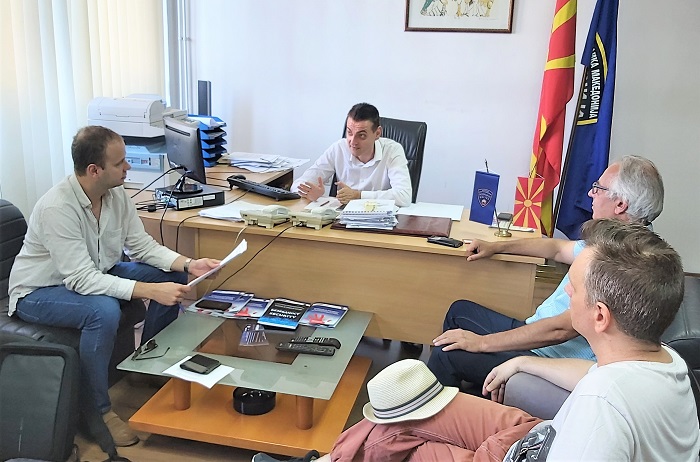
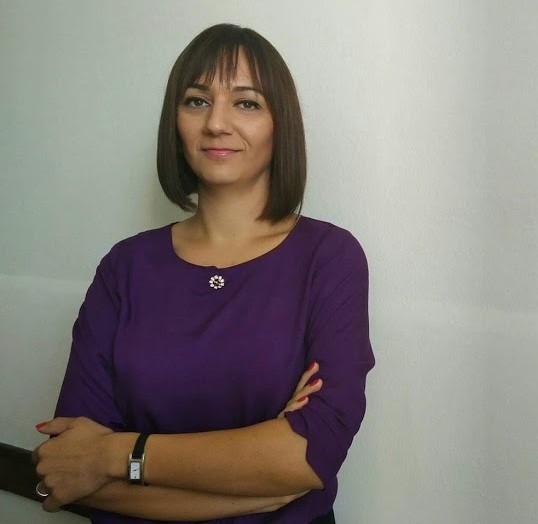
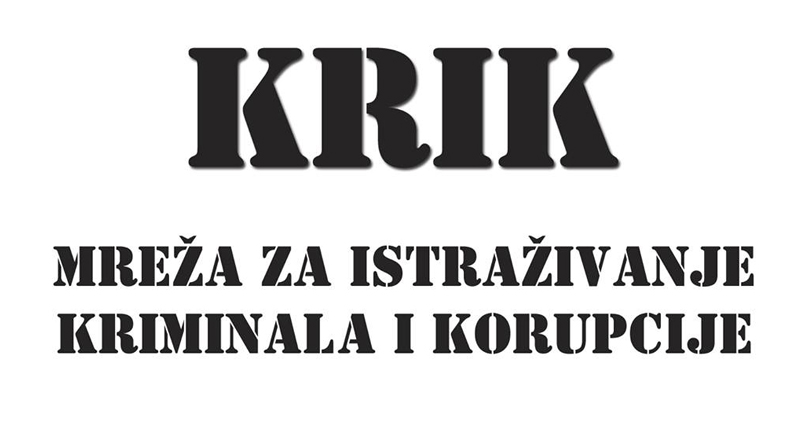

 This article has been produced with the support of the European Endowment for Democracy (EED). Its contents do not necessarily reflect the official opinion of EED. Responsibility for the information and views expressed in this publication lies entirely with the author.
This article has been produced with the support of the European Endowment for Democracy (EED). Its contents do not necessarily reflect the official opinion of EED. Responsibility for the information and views expressed in this publication lies entirely with the author.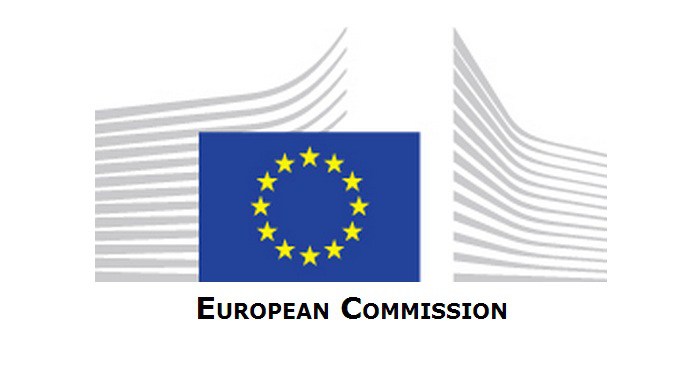
 While several cases were solved and criminal complaints filed, verdicts were still rare, the Report indicates. It further states that hate speech and discriminatory vocabulary are tolerated in the media and rarely solved by the regulatory authorities or prosecutors.
While several cases were solved and criminal complaints filed, verdicts were still rare, the Report indicates. It further states that hate speech and discriminatory vocabulary are tolerated in the media and rarely solved by the regulatory authorities or prosecutors. Dok je nekoliko slučajeva rešeno i podnete su krivične prijave, presude su još uvek retke, navodi Izveštaj. Takođe je navedeno da se govor mržnje i diskriminatorska terminologija tolerišu u medijima i retko rešavaju od strane regulatornih tela i tužilaštva.
Dok je nekoliko slučajeva rešeno i podnete su krivične prijave, presude su još uvek retke, navodi Izveštaj. Takođe je navedeno da se govor mržnje i diskriminatorska terminologija tolerišu u medijima i retko rešavaju od strane regulatornih tela i tužilaštva.